
Franne Golde: “I realized along the way that if you wanted to be considered at all, you had to write your own songs.”
Most musicians can only dream of achieving the phenomenal career that has been accomplished by this hugely successful songwriting legend
Beginning her career as a singer-songwriter in Chicago, Franne Golde started out by performing as a solo act and in bands while writing her own music. From collaborating with songwriter Carole Bayer Sager, Golde was introduced to the legendary music producer Richard Perry (Rod Stewart, Carly Simon, Harry Nilsson), with whom she would hone her writing skills and gain experience through penning lyrics for some of the world’s top music artists. This began with Gettin’ Ready For Love, a single from Diana Ross’ eighth studio album, which she wrote with frequent collaborator Tom Snow.
Golde went on to write such hits as Even If My Heart Would Break, as featured on The Bodyguard motion picture soundtrack and performed by Aaron Neville and Kenny G, Don’t You Want Me by Jody Watley, and I Belong To You by Whitney Houston. Dreaming Of You, a song released posthumously by prominent Tejano artist Selena, remains one of Golde’s most iconic songs and has survived as a token of the impact the singer continues to have on fans around the world.
Here, Golde discusses her journey in music, lessons learned along the way, and how she has branched out to contribute to the philanthropic organization Music Mends Minds…
When did music begin to become a passion in your life?
“Really, as long as I can remember. I always fell asleep with a transistor radio under my pillow.
Music sort of made sense of everything. [It] made me feel seen and understood and heard by these strangers that were amazing artists and songwriters. I had a bit of a tumultuous childhood, so it was so great to have the music to be my friend.”
What was some of your favourite music to listen to at the time?
“I was big into Top 40… Beatles, Beach Boys, anything Motown, [I was a] huge Motown fan, and then all those one-hit wonders.”
What were the early days of your music career like in Chicago?
“Well, I didn’t really start out as a songwriter per se. I was more concentrating on being a recording artist. I was just in love with Laura Nyro, Carole King, and I wanted to be one of them. So that was my first love, I suppose, and I did everything possible to make that happen. I would go to open mic nights and perform all around Chicago, wherever there was a piano bar. And, eventually, I met a guy and started a band with him.”
How did that develop into becoming a full-time songwriter?
“I had a few bands before I became a full-time songwriter and an artist, but I realized along the way that if you wanted to be considered at all, you had to write your own songs, unless you were like a Barbra Streisand, Celine Dion, or Whitney Houston. If you were a singer-songwriter, you had to write your own songs, obviously. So I did that. I started writing and sort of learned along the way, and worked with a lot of fantastic people who were so generous, taught me and gave me pointers. I’d been exposed to so much music by then and really had it within my DNA, so I think I had no choice. It just was part of who I was and really happened pretty naturally.”
How did meeting Richard Perry influence the course of your career?
“Immensely. I met him through Carole Bayer Sager. We were writing together, I was out in L.A. and we had nowhere to work. And so she said, ‘Oh, let’s go to my friend Richard’s house.’ I had no idea who Richard was, and it turned out it was her friend, Richard Perry. And so we were working at his house on his piano, he came home and he heard what we were doing.
“Then he asked Carole, ‘Who’s that girl?’ and the next thing I knew, probably within six or eight weeks, I had a publishing deal with Richard. He also was recording Diana Ross at the time, put me together with another one of his writers, Tom Snow, and we wrote Diana Ross’ first single [Gettin Ready For Love] from the album that he was producing, which happened to be my first worldwide top 10 single ever, and was quite an exciting time.
“He was amazing. He allowed me to sit in on sessions, watch the recording process live and in person, and he always pushed me to be better. If I wrote a lyric or something, he’d say, ‘That line can be better, that can be better.’ It would sometimes be while recording, and I would be freaking out, like, ‘Oh, my God, I’ve got to do this right this minute.’ But it was a very good lesson.”

Franne Golde (with husband Paul Fox): “Even when you feel you can’t do it well enough, or you wish you had more knowledge or you start to question yourself, you just have to move forward, even if it’s a baby step.”
Do you have a standard process you follow when writing songs?
“For me, it can be anything. I’ve never followed any process other than getting together with somebody. Somebody sits at the piano or picks up a guitar, plays synthesizers or gets a drum groove going. That will sort of initiate a feeling or a vibe, and they’ll play a couple of chords and all of a sudden, as though you’re a vessel, this amazing thing…well, not always amazing, but hopefully, it comes out of you and you start singing melodies and throwing lyrics out and writing things down. Really anything can initiate it. It kind of comes out of the ether, so to speak.”
What initiated the writing of Dreaming Of You?
“I was sitting with Tom Snow, who again I met through Richard. [Snow] started playing this chord progression and I thought, ‘That is just stunning.’ It just evoked such a deep emotional feeling within me that I just instantly started singing, “Late at night when all the world is sleeping”. It just flowed. It was one of those magical songs; sometimes they almost write themselves. You’re like the vessel and it just comes through you, and that was definitely one of those magic songs.”
How does it feel for you to see how strongly it has endured over time following Selena’s untimely passing?
“It’s just extraordinary how that song is so identified with Selena and her fans. It’s weird. I almost feel like the song isn’t mine. I’ve never said that before, [it] kind of just gave me a chill. I feel like it belongs to her and her fans. She’s so identified with that song and the fact that it came out when it did, posthumously, and when she says the talking part…It’s very eerie.
“I heard it shortly after her death. I went to the studio and heard the mix and I was just so moved and in shock, because I got to spend time with her, and she was such a wonderful girl and it was sort of surreal…the whole thing. It blows me away. I can’t believe how that song has just endured and taken on a life of its own.
“And she was so giving and generous, and so loved her fans and really, really gave herself. I’ll never forget as long as I live the day when I found out [she had passed], I just couldn’t believe it. I was shocked like the rest of the world.”
How was the experience of collaborating with Jody Watley to write Don’t You Want Me?
“Jody Watley is one of the best songwriters ever. She knows her audience. She really knows what she wants to say. She can hear a track and do a melody and lyric to it like nobody’s business. She’s wonderful. I cannot say enough good things about her. She’s the real deal. She is totally invested in her fans, communicative with her fans – one of the most talented people I’ve ever worked with and is genuine, loving, kind and resilient.
“She’s just a really wonderful, wonderful person. I just admire her reinvention and resilience because…she really took her career and she’s kept it going all these years… travels and really, again, engages with her fans. I can’t say enough about her anyway.”
What was it like to have a song on The Bodyguard soundtrack with Even If My Heart Would Break?
“That’s sort of like a songwriter’s dream. That song alone could be somebody’s career. It was so mind-blowing, opening up Billboard every week and seeing: number one, number one, number one, number one. I couldn’t believe it. I was high for a year. That was just such an amazing, amazing trip to be able to take.
“Jeff Healey was on Arista, with Clive [Davis], and originally Clive wanted the song for Jeff. I don’t know, it didn’t work out. I don’t remember all the particulars about it, but it was on hold for Jeff for probably about a year. Maybe even longer.”
What happened next?
“I guess [Davis] played it for Kenny G and said, ‘I’m doing this soundtrack to The Bodyguard, which is Whitney’s first movie, I’d love you to be a part of it.’ And Kenny was doing very well at the time, and he played him the song. [Kenny G] was sort of lukewarm about it…
“In the meantime, I was emailing and calling Clive probably every couple of months. I didn’t want to be a total pest, but [I’d ask], ‘Is my song still on hold? Is something going to happen with it?’ [He’d say], ‘Oh, yeah, I still have it. I still want to have it on hold’. That was great, so I knew something was going to happen with it.”

Franne Golde: “I’d been exposed to so much music by then and really had it within my DNA.”
How did it end up with Aaron Neville?
“I guess they tried to get a hold of a few different singers. I know Rod Stewart was in the running. He had already recorded something a little bit similar, so he didn’t end up doing it. Then, I don’t remember exactly how it happened, but Aaron Neville showed up on the scene, and I guess once Kenny heard his vocal, he flipped out. He thought it was fantastic. He loved the track, so much so that he also put it on his album.
“So it was not only on The Bodyguard, but on his album. And of course, The Bodyguard went on to sell, I don’t even know anymore. The last time I looked, I think it was…40, 45 million. And Kenny’s album was, I think, the biggest album he ever had. I think it sold over 20 million worldwide. So just that alone is 60, 65 million records worldwide. It’s insane.”
How did you get involved in Music Mends Minds, an organization that provides musical support groups for clients with neurological disorders?
“Well, unfortunately, my husband [Paul Fox], who was an amazing record producer, was diagnosed with early-onset Alzheimer’s in his mid-50s. I was determined to somehow keep him involved in music. I kept looking and looking and looking. And somebody mentioned to me, oh, there’s this new thing starting called Music Mends Minds. They had just started.
“We went to check it out, and my husband, of course, was always the youngest guy in the room wherever we went having to do with Alzheimer’s, and this was no exception. They were doing more of the American songbook. They had bands and singers, and so people would be part of the band and/or sing.
“At first, he was like, ‘This is not for me, I’m out of here,’ and…[I said], ‘Just go two or three times. If you hate it, you never have to go again. But just give it a shot.’ So on the third time, he ran into a friend who had recently been diagnosed with Parkinson’s, who also was in the music business, and they just saw each other, fell into each other’s arms, were both fighting a very serious illness, and that was it. They bonded. They stuck together and they became part of that.”
What was Paul’s experience with the organization like after that?
“Paul really helped out in the beginning. I would tell him, ‘Forget that you’re part of Music Mends Minds, you’re also a record producer and you’re helping these other people. You’re the young guy in the group and you can help a lot of people and be an example.’ So it was great and he still is part of the organization, albeit it’s on Zoom now.
“I guess the fortunate part is it’s now gone global because of the pandemic, and he’s been with them now for probably most of the seven years that they’ve been around. I love being part of it and helping them because it’s instant gratification. It’s not…waiting for this hopeful cure one day, it’s something that’s immediate for families and for people who have the disease.
“And it could be PTSD,…I know they had a group at The Veterans Administration, people coming back from Iraq with brain injury, and it’s anyone who has anything brain-related. It’s just a great organization, and you see the people online now or even before when it wasn’t on Zoom, who can’t engage, some of them can’t even speak, and then they come to life. They can sing, play an instrument, and it’s like watching a miracle. People never really forget music and the feeling that it gave them and gives them.”
What advice would you give to aspiring songwriters?
The bottom line, I think, is that you always have to come from the heart with anything you do and the rest will follow. I’m sort of living proof of that. As far as dreams and passion and being a songwriter or an actor, or whatever it is you want to do in life, the bottom line is you have to take action. So many people talk about their dreams, their ideas… ‘I’m going to do this. I’ve got this idea,’ but they never take the steps to manifest them. And the only way, I can only speak for myself, that I’ve ever made anything happen is just by doing it. Even when you feel you can’t do it well enough, or you wish you had more knowledge or you start to question yourself, you just have to move forward, even if it’s a baby step.
“Stay out of your own way, don’t sabotage yourself and just go for it. Even when it’s uncomfortable, it’s quite extraordinary what you find in those spaces, in between the discomfort and just moving forward.”
Interview: Devin Herenda


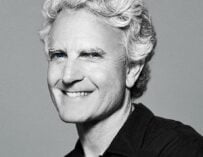
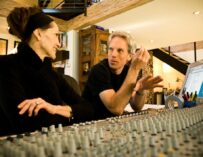
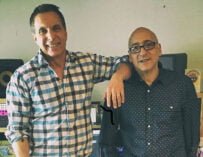
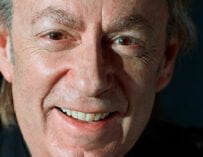

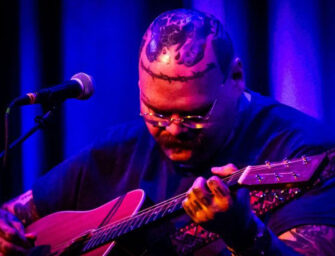
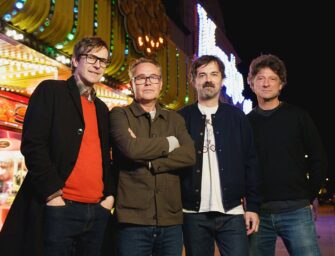

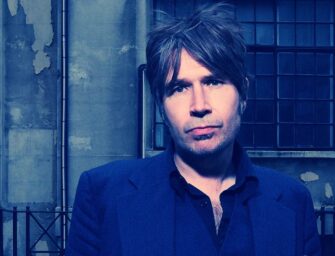























Related Articles